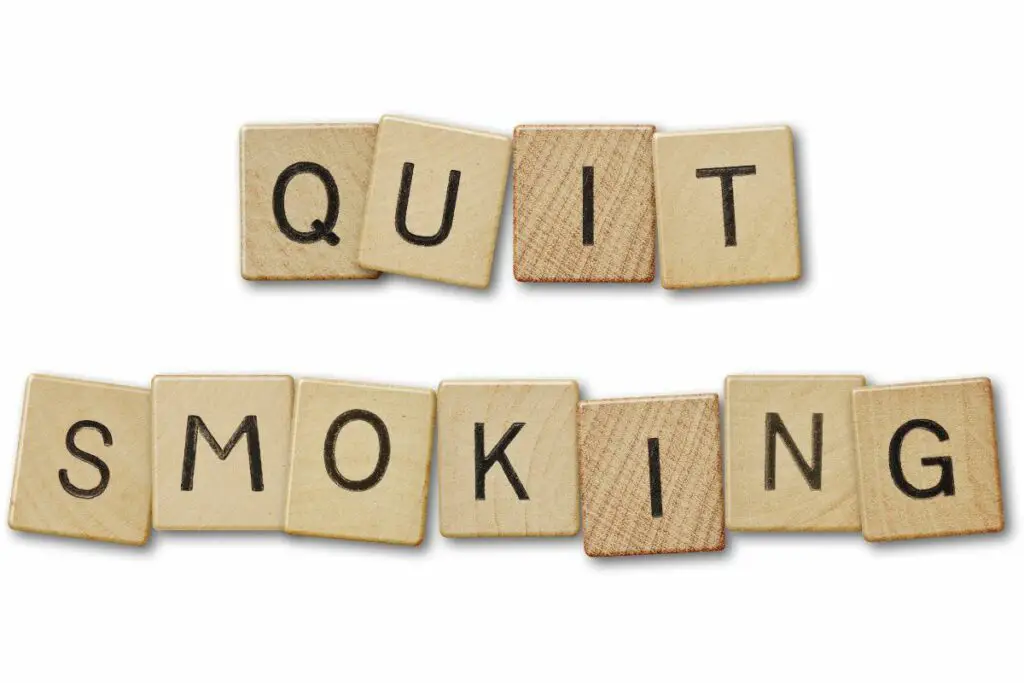Smoking is a dangerous habit that will have serious consequences on your health. But quitting is possible – I’ll show you how.
Are you looking for ways to quit smoking? If so, you’re not alone. Every year, millions of people try to quit smoking. But quitting isn’t easy. It can be hard to know where to start.
If you’re looking for the best tips for quitting smoking, you’ve come to the right place. Notably, quitting smoking is a process, and there’s no one-size-fits-all approach that will work for everyone.
However, there are a few general tips that can help increase your chances of success. Let’s discover what they are.
- Smoking is a dangerous habit that will have serious consequences on your health. But quitting is possible – I'll show you how.
- Tips to quit smoking
- 1. Set a quit date
- 2. Get rid of all tobacco products
- 3. Make a list of reasons why you want to quit
- 4. Understand your triggers
- 5. Choose a method to help you quit smoking
- 6. Tell Your Friends and Family about Your Decision to Quit
- 7. Avoid Places where People Smoke
- 8. Keep Your Hands and Mouth Busy
- 9. Improve your lifestyle.
- What if I fail at my attempt to quit smoking?
- Benefits of quitting smoking
- Factors that influence the possibility of quitting smoking
- What stages will I go through if I decide to quit smoking?
- What are some other toxic habits that I should consider quitting?
Tips to quit smoking
First and foremost, it’s important to be prepared mentally and emotionally for the challenge ahead. This includes developing a solid plan for dealing with cravings and setbacks.
Additionally, it’s helpful to find sources of support to keep you motivated throughout the quitting process. By following these tips, you’ll be well on your way to becoming smoke-free. Here are some specific steps to get you started.
13.5 % of American women and 17.5 % of American men currently smoke.
Truth initiative, 2018
More than 70% of smokers desire to quit. Of these, approximately 56% will attempt to quit and less than 8% will successfully quit.
Fortunately, the possibility to successfully quit increases with each quit attempt.
1. Set a quit date
The first step to quitting smoking is to set a quit date. This will give you something to work towards and will help to keep you motivated.
Tips to set a start date
- Choose a date that is meaningful to you.
- Set a realistic timeline for quitting.
- Put it in writing and post it somewhere visible to remind yourself of your goal.
Even though this is a target date to aim for , it is important to remember that quitting smoking is a process and you may not be able to quit on the first try. It’s okay if you need to make adjustments or take more time to get there.
Read also: How To Break Bad Habits That Affect Your Life
2. Get rid of all tobacco products
Once you have set a quit date, the next step is to get rid of all of your cigarettes and other smoking paraphernalia. This includes anything that reminds you of smoking. You may also want to consider getting rid of any clothing that smells like smoke.
Getting rid of these items will help to reduce your temptation to smoke. This process may include asking a friend or relative to take them away, putting them in an inaccessible place or simply throwing them out.
Smoking paraphernalia refers to any apparatus/equipment including lighters, ashtrays, hookah, pipes etc. that is needed for smoking.
Law insider, no date

3. Make a list of reasons why you want to quit
Before you quit, it can be helpful to make a list of all the reasons why you want to quit smoking. This can include both health-related and non-health-related reasons. Keep this list somewhere where you can see it every day, such as on your fridge or mirror.
| Reasons to Quit Smoking | Rational |
|---|---|
| For your health | Quitting smoking is one of the best things you can do for your health. It can add years to your life and make you feel better overall. |
| To save money | Smoking is an expensive habit, and quitting can save you a lot of money over time. |
| For your family | Quitting smoking will improve your health and the health of those around you. It will also set a good example for your children. |
| To be smoke-free | Smoking is an addictive habit, and breaking free from it can be empowering. |
| Because you can | Quitting smoking is a challenge, but it is one that you can overcome. It will take time and effort, but you can do it! |
4. Understand your triggers
Smoking is often triggered by certain activities or situations. It’s important to be aware of your triggers so you can avoid them or have a plan for how to deal with them when they occur.
Common triggers for smoking
- Drinking alcohol or coffee
- Being around other smokers
- Experiencing stress, anxiety or excitement
- Boredom
- Hunger or after eating
5. Choose a method to help you quit smoking
There are many different methods that can help you quit smoking, including medication, nicotine replacement therapy (such as patches or gum), and counseling.
However, these will likely have side effects and may also have some dietary and lifestyle restrictions. But, if needed, they are definitely worth a try. Talk to your doctor about which method might be right for you.
There are some persons who’ve managed to quit “cold turkey” or without any external help. However, it’s important to note that withdrawal symptoms are very real and can be difficult to manage if you don’t have the necessary support.
For those using the ‘cold turkey’ approach, only 3-5 % of persons were able to quit for longer than 6 months. Conversely, medications and counseling tripled the chances of success.
truth initiative, 2018
Consider watching this video on YouTube. Remember to subscribe for the latest wellness videos.
Common withdrawal symptoms from smoking include
- Cravings
- Anxiety
- Irritability
- Sleeplessness or restlessness
- Difficulty concentrating
- Increased hunger or weight gain
- Headaches
- Dizziness
There are medications available to help you manage these symptoms, so it’s important to speak to your health care provider. Withdrawal symptoms may initiate a relapse, so it’s important to get the necessary support and guidance in quitting.
Unfortunately, these symptoms can start within hours of quitting and usually intensify over first few days/week before they start to ease off.
Read also: Why Are Habits More Important Than Inspiration?
6. Tell Your Friends and Family about Your Decision to Quit
Telling your friends and family about your decision to quit smoking is a great way to stay motivated. They will be able to offer support and encouragement throughout the process. Additionally, they will be less likely to pressure you into smoking if they know that you are trying to quit.
Avoiding sharing your goals with persons who are overly judgmental, those who may encourage you to continue or simply have no belief in your ability to quit.
7. Avoid Places where People Smoke
Another way to reduce your temptation to smoke is to avoid places and people that make you smoke. This includes bars, clubs, and anywhere else where there is a high concentration of smokers.
If you cannot avoid these places altogether, try to spend less time in them or go at times when there are fewer people smoking.
8. Keep Your Hands and Mouth Busy
One of the hardest things about quitting smoking is dealing with the cravings. One way to distract yourself from these cravings is to keep your hands and mouth busy.
This can be done by chewing sugarless gum, eating snacks, pickles or hard candy, or playing with a stress ball. This will help make the cravings more bearable.
9. Improve your lifestyle.
Eating healthy foods will help your body heal from the damage caused by smoking and give you more energy. Also remember to stay hydrated.
Exercising regularly will help your body heal from the damage caused by smoking and also give you more energy. Additionally, journaling and meditation will be beneficial. These strategies will also be beneficial if you have concerns about weight loss after quitting.
Read also: Why Is Self-Care Important? + Top Tips To Prioritize It

What if I fail at my attempt to quit smoking?
Don’t be dismayed if you had failed attempts at quitting. Realize that the desire to change means that you’ve already started the journey.
Read more about the different stages of behavioral change.
So just keep going and understand that:
1. It’s common
Many people try to quit smoking several times before they are successful. Don’t be discouraged if you have had unsuccessful attempts in the past – each time you try, you are one step closer to quitting for good.
2. You’ll learn from your mistakes
Each time you try to quit, you will learn more about what works for you and what doesn’t. This knowledge will help you be successful the next time around.
3. You can do it!
Quitting smoking is a difficult challenge, but it is one that you can overcome. Believe in yourself and keep trying – you will eventually be successful!
Acknowledge that changing unhealthy behaviors often require significant effort. Think positive, have a plan.
Avoid triggers, increase your social support system and talk to your physician to decide if medication should be used to help you on the journey.
Benefits of quitting smoking
The benefits of quitting smoking are numerous. The most immediate benefit is to your health. Quitting smoking reduces your risk of heart disease, stroke, lung cancer, and other types of cancer.
It also reduces your risk of developing chronic obstructive pulmonary disease (COPD) and other smoking-related illnesses. In addition to the benefits to your health, quitting smoking can also improve your finances.
Smoking is the number one cause of preventable death in the United States and results in nearly one in five deaths each year. This means that smoking causes more deaths than HIV, alcohol use, motor-vehicular accidents, firearm incidents and illegal drug use combined.
CDC, 2021
The money you save by not buying cigarettes can be used to pay down debt or build up savings. Additionally, quitting smoking can improve your appearance, as smokers often have yellow teeth and nails, and smokers’ breath can be unpleasant.
Finally, quitting smoking can improve your sense of smell and taste. If you are a smoker who is considering quitting, know that the benefits far outweigh the costs. Quitting smoking is one of the best decisions you can make for your health, your finances, and your overall well-being.
The benefits of quitting smoking include:
- No more burns on your fingers, clothes or furniture.
- Decrease in body odor.
- Increased sense of smell and taste.
- Improved quality of life by reducing the risk of cancer, heart disease and lung disease.
- Stress reduction.
- Less wrinkles and signs of premature aging.
- Decreased risk of osteoporosis and hip fractures due to increased bone density.
- Deeper, more relaxed breathing.
- Improved lung function.
- Being more energetic.
- Weight gain and improved appetite.
- Save money.
Read also: 9 Key Reasons Why Behavior Change Is Important
Factors that influence the possibility of quitting smoking
Factors that may influence the possibility of quitting smoking include:
1. Health Concerns
One of the primary factors that may influence a smoker’s decision to quit is health concerns. Cigarette smoking is the leading cause of preventable death in the United States, and smokers are at an increased risk for a variety of health problems, including cancer, heart disease, and stroke. Quitting smoking can reduce the risk of developing these and other health problems.
2. Cost
Another factor that may influence a smoker’s decision to quit is the cost of smoking. Cigarettes costs do add up, and smokers may find that they are spending a significant amount of money on their habit each month. Quitting smoking can save a smoker a significant amount of money over time.
3. Family and Friends
Smokers may feel pressure from loved ones to quit, or they may be influenced by seeing friends or family members successfully quit smoking.
4. Pregnancy
Pregnancy is another factor that may influence a woman’s decision to quit smoking. Smoking during pregnancy can cause a variety of health problems for both the mother and the child, and pregnant women who smoke are more likely to have premature or low-birth-weight babies.
More than 15 % of pregnant women in America are smokers. According to research, about 55% of those who smoked during the 3 months preceding their pregnancy were able to successfully quit. Unfortunately, 43% restarted smoking approximately 6 months postpartum.
Truth initiative, 2018
5. Workplace Policies
Many workplaces now have policies that prohibit smoking on company property, and some employers provide incentives for employees who quit smoking.
6. Social Pressure
Smoking has become increasingly socially unacceptable in recent years. More and more people are choosing to avoid smokers due to the health risks associated with secondhand smoke. This social pressure may influence a smoker’s decision to quit.
7. Family History
A family history of smoking-related health problems may also influence a person’s decision to quit smoking. If a person has relatives who have developed cancer or other health problems due to smoking, they may be more likely to try to quit themselves.
8. Length of time smoking
Older smokers are less likely to attempt to quit smoking perhaps due to their beliefs about quitting including thoughts that quitting is no longer advantageous.
Remember, it’s never too late. Research has shown that quitting smoking at any point of your life – even if you’ve smoked for 2 packs daily for 50 years – will be beneficial.
9. Amount you smoke per day
Smokers who smoke more cigarettes each day are generally more addicted to nicotine and may find it more difficult to quit. However, smokers who smoke fewer cigarettes each day may be more likely to try to quit because they may feel like their chances of success are higher.

10. Age
Age can also influence a person’s decision to try to quit smoking. Although younger smokers tend to attempt to quit more than older smokers, more than half of teens who admitted to smoking did not even attempt to quit. However, female students attempt to quit more than males.
11. Gender
Gender can also play a role in a person’s decision to try to quit smoking. Some may argue that women are generally more health-conscious than men and may be more likely to try to quit smoking for health reasons. But here’s what research shows:
Overall, quit attempts and successful quitting rates are similar for both men and women.
Truth Initiative, 2018
Quit attempts decrease with age, likely due to challenges of changing established behaviors.
12. Previous attempts to quit smoking
People who have tried to quit smoking before and failed are more likely to try to quit again and to eventually be successful. They often are aware of the difficulties involved in quitting, develop more targeted strategies, and are more focused on their reason for quitting.
13. Life circumstances
Life circumstances can also play a role in a person’s decision to try to quit smoking. People with lower educational and/or economic levels have a lower possibility of successfully quitting.
Persons who are uninsured, the lesbian, gay and bisexual community and those with mental health challenges also have few attempts and lower rates of successfully quitting (Truth Initiative, 2018).
Further, Black Americans have the highest interest in quitting and the lowest possibility of success with the Asian population recording the highest success rates.
14. Social support
People who do not have any social support for quitting may be less likely to try to quit because they may feel like they are alone in their decision.
15. Motivation
Motivation can also play a role in a person’s decision to try to quit smoking. People who are motivated to quit smoking for health reasons may be more likely to try to quit than people who are motivated to quit for other reasons, such as financial reasons.
However, people who are motivated to quit for other reasons, such as family or social pressure, may be less likely to try to quit because they may not be fully committed to the decision.
16. Whether or not you smoke at home
Whether or not you smoke at home can also play a role in a person’s decision to try to quit smoking. People who do not smoke at home may be more likely to try to quit because they are not exposed to the smells and sights of smoking.
17. The type of cigarettes you smoke
The type of cigarettes you smoke can also play a role in your decision to try to quit smoking. People who smoke menthol cigarettes may be more likely to try to quit because they are aware of the health risks associated with smoking. Notably some countries have a ban on menthol cigarettes.
18. The use of illicit drugs
People who use and are addicted to illicit drugs may find it even more challenging to quit smoking. However, about 44-80% of this population are actually desirous of quitting (Prochaska et al., 2004).

Final words on top tips to quit smoking
Although it can be difficult to quit smoking, there are many helpful resources available to assist you in your journey. Even if you manage to quit for only 12 hours, you will start to notice the benefits.
Within hours of smoking the last cigarette, your heart rate and blood pressure will decrease and within 24-48 hours, carbon monoxide levels in your body will return to normal. In only 2-3 weeks circulation and lung function will improve. With each subsequent year of not smoking, your risk of lung, throat, and bladder cancer decreases. So if you haven’t started quitting yet, what are you waiting for?
Comment below and let us know how these tips have work for you, or if you have any additional advice to share!
Related topics
What stages will I go through if I decide to quit smoking?
If you’re considering quitting smoking, it’s important to be aware of the different stages you may go through. For instance, in the precontemplation stage, you’re not yet ready to quit. You may not even be considering it as an option.
During the contemplation stage, you start to become more open to the idea of quitting and begin to weigh the pros and cons. Once you’ve decided that you want to quit, you enter the preparation stage. Read more
What are some other toxic habits that I should consider quitting?
There are many toxic habits that can damage our health, including smoking, drinking too much alcohol, and eating unhealthy foods. However, there are other habits that can be just as harmful to our health, even if we don’t realize it.
For example, spending too much time on our phones or laptops can lead to neck and back pain, and exposure to blue light can disrupt our sleep patterns. Furthermore, sitting for long periods of time has been linked to a number of health problems, including obesity and heart disease. Read more
References
CDC (2021) Health Effects of Cigarette Smoking
Hoek J, Edwards R, Waa A From social accessory to societal disapproval: smoking, social norms and tobacco endgames, Tobacco Control 2022;31:358-364.
Law Insider (no date) Smoking paraphernalia
National Cancer Institute (2022) Handling Nicotine Withdrawal and Triggers When You Decide To Quit Tobacco
Prochaska JJ, Delucchi K, Hall SM. A meta-analysis of smoking cessation interventions with individuals in substance abuse treatment or recovery. J Consult Clin Psychol. 2004 Dec;72(6):1144-56.
Truth Initiative (2018) What you need to know to quit smoking









